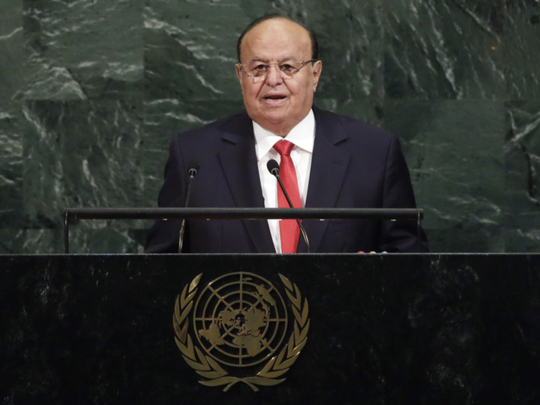
Al Mukalla: A solution in Yemen’s two and-a-half year-old civil war will likely come through military rather than political means, the country’s Saudi-backed president said, blaming the Iran-backed Al Houthis of obstructing chances of peace.
Speaking in New York on the sidelines of the UN General Assembly, President Abd Rabbo Mansour Hadi also told the Saudi-owned Al Arabiya channel that a plan to hand over control of the country’s main port to a neutral party remained blocked by Al Houthis and their ally, former President Ali Abdullah Saleh.
“The military solution is the more likely one for the Yemen crisis in light of the intransigence of Al Houthi and Saleh coup militias which continue to take orders from Iran,” Hadi said in the interview, according to a text provided by the Yemeni state-run Saba news agency.
“Despite that, the legitimate government continues to extend its hand for peace because it is responsible for the Yemeni people and for lifting the suffering from it,” he added.
More than 10,000 people have been killed in the war, which began in March 2015 when Al Houthis advanced on Hadi’s interim headquarters in the southern port city of Aden, forcing him to flee the country and seek Saudi military help.
A Saudi-led coalition has since joined the fighting in a war that has also caused one of the world’s worst humanitarian crises and shows no signs of ending soon.
Al Houthis deny having significant ties to Iran, and say the Saudi-backed coalition seeks to foment “destruction” inside and outside the region.
Hadi accused former US President Barack Obama of turning a blind eye to what he described as Iranian expansion that allowed Al Houthis to seize the Yemeni capital Sana’a as he was only preoccupied with the success of nuclear talks with Tehran.
“But the position under the current administration is better because it stands on the basis that there should be pressure on Al Houthis and Iran so their expansion in the region would stop.” Hadi said Al Houthis still had a chance to join the political process if they agreed to hand over weapons and formed a party to help pursue national reconciliation. Al Houthis say they are willing to hand over their weapons to a national unity government formed to represent the whole country.
Speaking about the battle on the ground, Hadi said that he has ordered his commanders not to shell Al Houthi positions in Sana’a in order to avoid civilian casualties.
“We can shell Sana’a and act like how they do in Taiz. But we do not want to harm civilians,” Hadi said.
He added that his government has suffered from severe cash shortage since the rebels refused to send revenues from their territories which account 70 per cent of the country’s GPD to the central bank of Aden.
The sharp decline of oil exports from 127,000 barrels per day to 30,000 barrels per day today has exacerbated the problem and contributed to the declining value of the country’s currency, Hadi said.
“We only produce 30,000 barrels per day and we share them with oil companies,” Hadi said.
A recent UN proposal calls for Al Houthis to hand over control of the Hodeida seaport to a neutral Yemeni party under the aegis of the UN and therevenues would be collected and deposited into the central bank.
Hadi’s government has accepted the proposal while Al Houthis have rejeted it.
“We agreed that the money be used to pay public servants inside Al Houthi-held territories. They rejected the proposal and insisted on using 70 per cent of state’s revenues on their military efforts. They neither want to release the revenues nor pay government employees in their areas,” he said.
-with inputs from Reuters












